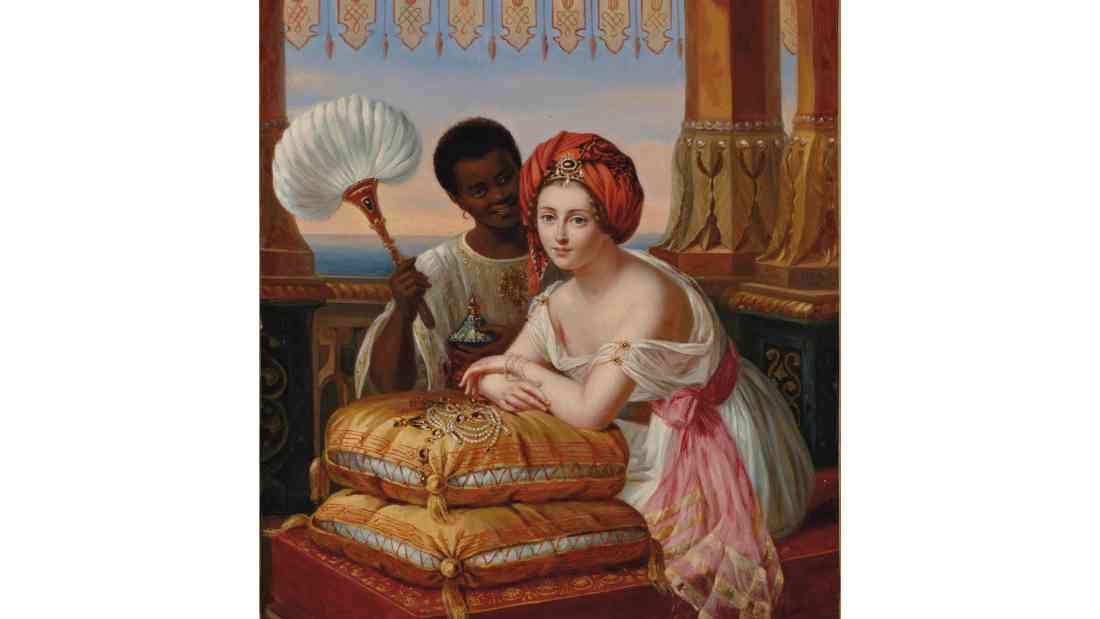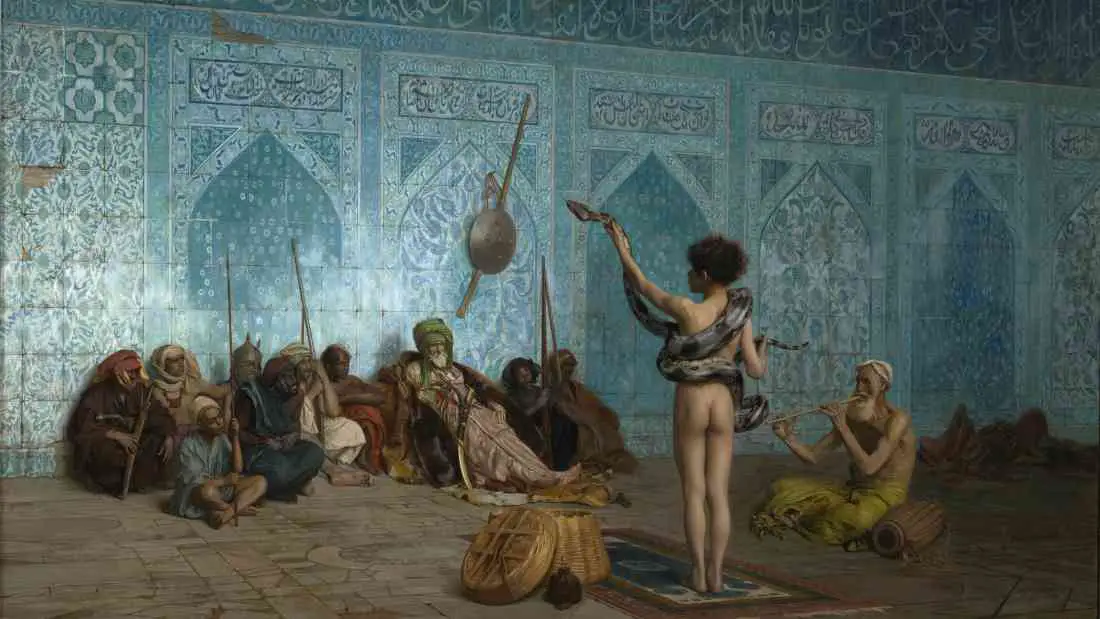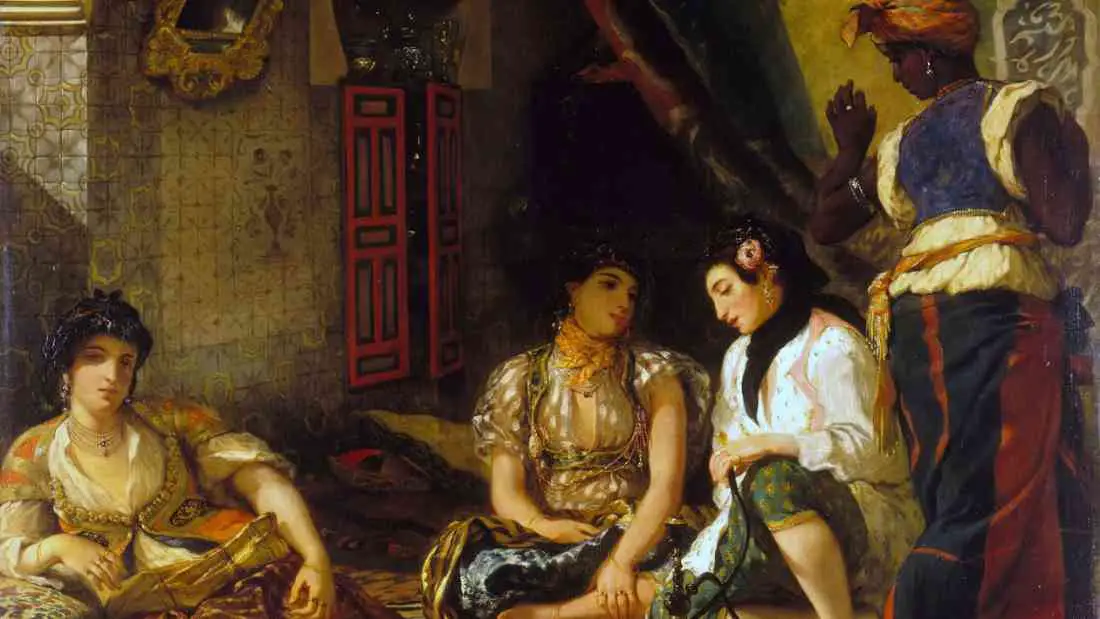Edward Said’s body of work about Orientalism, which includes his influential 1978 book Orientalism: Western Conceptions of the Orient electrified the scholarly debate about the representation of Eastern societies and cultures.
The core premise of his book was the claim that the East had been ‘otherised’ as ontologically different, exotic, and inferior by influential thinkers in the West for hundreds of years (Said 1978; Lockman 2004: 188; Vargas-Cetina 2013; Shohat & Stam 2014; Lutz and Collins 2020).
Furthermore, Said argued that since the late eighteenth century, the misrepresentation of the Orient had been amplified and weaponised by Euro-American powers as a ruse to justify the domination, exploitation, and oppression of eastern countries during the expansionist colonial era (Assad 1978: Said 1978; Lockmann 2004; Shohat & Stam 2014; Lutz and Collins 2020).

Edward Said’s argument about Orientalism rests on a Foucauldian discourse analysis, connecting the language and images conceived of the Orient by western authors to the power structures and socio-economic interests of the West.
He argues that these bodies of knowledge about non-European cultures were not impartial, but instead were heavily influenced by political, economic and social factors.
To support his case, Said referred to a wide range of authoritative sources, including poets, philosophers, authors, theorists and administrators, starting with the playwrights of ancient Greek, to French and British writers in the eighteenth and nineteenth century, and the writings of contemporary Orientalists and Arabists (Said 1978; Lockman 2004).
In this essay I will be examining Edward Said’s influential 1978 work Orientalism and its stand-off with the academic institution of Orientalism of the time.
Furthermore, I will also consider critiques of his book by prominent Orientalists and Arabists and Said’s subsequent response, as part an ongoing debate about the status and validity of Orientalism in academic research.
In the introductory chapter to his book, Said does not mince his words, boldly asserting that the Orientalist writings of many academics and other experts were not in fact an accurate account of the Orient, but instead a perpetuation of a discourse constructed by and enabling European-Atlantic power.

He argued that this body of work was not just “a structure of lies or myths,” but rather was intended to justify the subordination of non-European cultures and peoples by Western powers.
Said further denounced Orientalist scholars for claiming to present a “veridic discourse” about the Orient, while consistently producing representations of the non-Western world that reinforced stereotypes such as Oriental authoritarianism and sensuality (Assad 1978, Said 1975: 410; Said 1978: 6; Lockman 2004: 118).
He described such discourse as the production of ‘myths,’ pointing out that it was ludicrous for anyone to claim to understand and describe ‘the Arabs’ or ‘the Arab mind’ because ‘Arabs all told number over a hundred million people and at least a dozen different societies,’ so it was impossible to study or describe them ‘as a single monolith’ (Said 1975: 90).

Thus, such over-generalised depictions were nothing but the discourse of power, underpinning Euro-American socio-economic interests (Said 1982 as cited in Lockman; 191)).
It is important to note, however, that Said was also careful to point out that things were starting to change, and that there were scholars who were pushing back against the entrenched discourse, criticising the sweeping statements made in certain Orientalist representations, and also assessing the positionality of the creators of said content (Said 1978: 326; Lockman 2004: 189).
There is no doubt, however, that Said’s work was polemical, and his tone in the book and in some of his articles was quite aggressive, so as such it was inevitable that such a direct attack would lead to heated response, particularly from leading Orientalists whose credentials and output Said had questioned.
One of the most vitriolic critics was Bernard Lewis, a professor of Near Eastern Studies at Princeton Universal, who had been directly targeted for criticism in Said’s writings.

Lewis made several accusations about Said’s motivations, claiming that he was accusing Orientalist scholars of being part of a ‘deep and evil conspiracy,’ acting maliciously to subjugate the Orient.
In truth, this is not the point that Said was making about the way scholars such as anthropologists, historians or travel writers represented the Orient.
His claim was not that they were misrepresenting non-Europeans for nefarious purposes, but rather that while they may have tried to be, and probably believed they were, neutral observers, their existence as members of the dominant colonial culture shaped their views, and coloured the way they portrayed these societies to their audience (Said 1973; Lockmann 2004: 192).
This influence was one of the main thrusts of Said’s argument about the flawed representation of colonised nations by scholars representing the Orient –
‘… for a European or American studying the Orient there can be no disclaiming the main circumstances of his actuality: that he comes up against the Orient as a European or American first, as an individual second. And to be a European or an American in such a situation is by no means an inert fact’
(Said 1973: 11).
Therefore, Said’s work called for greater self-awareness and critical reflection on the part of Western academia to reduce the influence of pre-existing representations and discourse about the Orient, to create more equitable representations of the region that accurately acknowledged its diverse cultures and ensured respect for its people.
This was essential not only to foster greater understanding between East and West but also to combat systemic racism and inequality that had been perpetuated, often unknowingly, within academic discourse itself.
In addition to Lewis, several other historians and Orientalists reviewed Orientalism or wrote articles to respond to some of the claims and conclusions reached in the book.
One of the main issues they identified was that Said’s analysis was incomplete, as it overlooked the important contributions of German and Soviet Orientalists.
This, they argued, led to an inaccurate understanding of the broader context and the entire body of work developed by Orientalist scholars, resulting in biased conclusions about the West’s relationship with ‘the Orient’ in general (Lockmann 2004: 190).
This was in fact the main point made by Malcolm Kerr, who at the time was a professor specializing in the Middle East and the Arab world at the University of California, Los Angeles, in a review of Orientalism which was published in the International Journal of Middle East Studies.
While calling Orientalism ‘a book that in principle needed to be written’ (Kerr as cited in Lockman 2004: 193), he maintained that Said should have tested his claims by incorporating works from Orientalists from countries other than Britain, France and the US in his analysis.
Furthermore, he also highlighted the fact that Said was very selective as to which US-based scholars he quoted, ignoring academic efforts that were already under way to resist the misrepresentation of Oriental people (Kerr as cited in Lockman 2004: 193).
Kerr’s feedback had merit, because there had already been several efforts and considerable scholarly output from British and US-based academics that pushed back against the generalisations inherent in some representations of the Orient prior to the publication of Said’s Orientalism (Lockman 2004: 183).
Furthermore, the exclusion of Orientalist and other scholars and writers from countries that did not have imperialist interests was problematic because it meant that Said did not construct a full picture of the discourse and cultural relationship between East and West, and it is indeed possible that this omission impacted his conclusions.
It is in fact somewhat ironic that in making the argument that Orientalists ignored the variety and differences between different Arab societies when making sweeping generalisations about the non-European world, he himself was guilty of ignoring the diversity and differences in background of the international cohort of Orientalists.
In addition to the critique relating to the selective inclusion of scholars in his analysis, there was also concern regarding Said’s focus on specific Arab societies, excluding other countries which should also have formed part of his analysis.
Maxime Rodinson, a French Marxist scholar admired by Said, commented that –
‘his nationalistic tendencies have prevented him from considering, among others, the studies of Chinese or Indian civilization, which are ordinarily regarded as part of the field of Orientalism … even Arab nations in the West receive less than their due in his interpretation’
(Rodinson as cited in Lockman 2004: 195)
Furthermore, an argument can also be made about the temporal dimension of some of the claims made by Said in his book.
The Syrian philosopher Sadik Jalal al’Azm pointed out that by –
‘tracing the origins of Orientalism all the way back to Homer, Aeschylus, Euripedes and Dante … the author seems to be saying that the “European mind,” from Homer to Karl Marx to H. A. R. Gibbs, is inherently bent on distorting all human realities other that its own for the sake of its own aggrandisement.”
(al’Azm as cited in Lockman 2004: 196).
It is thus clear that Said’s Orientalism, which is widely regarded as one of the most influential works in post-colonial studies, had a major impact on the way we view, discuss and understand Western perceptions of other cultures.
His analysis provides a much-needed insight into how these attitudes have shaped our understanding of global history and relations, sparking much needed debate about how power structures impact academic discourse and representation, in the process perpetuating and reinforcing harmful preconceived notions about non-western peoples, leading to the marginalization and denigration of certain cultural identities by suggesting that they are less worthy or inferior than those of the West.
The book sparked important conversations about how to challenge these structures to create a more equitable academic discourse and better representations of the Orient, with the ultimate aim of building bridges between East and West and fostering greater understanding.
Bibliography
Asad, T. (1979) ‘Anthropology and the Colonial Encounter.’ In Huizer, G., Mannheim, B. (eds), The Politics of Anthropology: From Colonialism and Sexism Toward a View from Below. De Gruyter, Inc., Berlin/Boston.
Gleach, F. (2013) ‘Notes on the Use and Abuse of Cultural Knowledge.’ In Vargas-Cetina, G, Nash, J., Igor Ayora-Diaz, S., Conklin, B.A. and Field, L.W. (eds), Anthropology and the Politics of Representation. The University of Alabama Press: Tuscaloosa, pp. 176–190.
Lockman, Z. (2004) ‘Said’s Orientalism: A Book and Its Aftermath.’ Contending Visions of the Middle East. Cambridge University Press, pp. 182–214.
Lutz, C., and Collins, J. (2002) ‘The Color of Sex: Postwar Photographic Histories of Race and Gender.’ In Askew, K., Wilk, R. (eds), The Anthropology of Media. Blackwell Publishers, Oxford.
Said, E. (1975) ‘Shattered Myths.’ In Naseer, H. (ed.), Middle East Crucible. Medina University Press, pp. 410 – 427.
Said, E, W. (1978) Orientalism: Western Conceptions of the Orient. Pantheon Books: New York.
Shohat, E., Stam, R. (2014) Unthinking Eurocentrism: Multiculturalism and the Media (2nd ed.). Routledge, London.
Mackay, R. (2017) ‘Nanook of the North: All the Worlds a Stage.’ Queen’s Quarterly, vol. 124, no. 2, pp. 249–258.
Vargas-Cetina, G. (2013) ‘Introduction: Anthropology and the Politics of Representation.’ In Vargas-Cetina, G, Nash, J., Igor Ayora-Diaz, S., Conklin, B.A. and Field, L.W. (eds) Anthropology and the Politics of Representation. The University of Alabama Press, Tuscaloosa, pp. 1–15.

